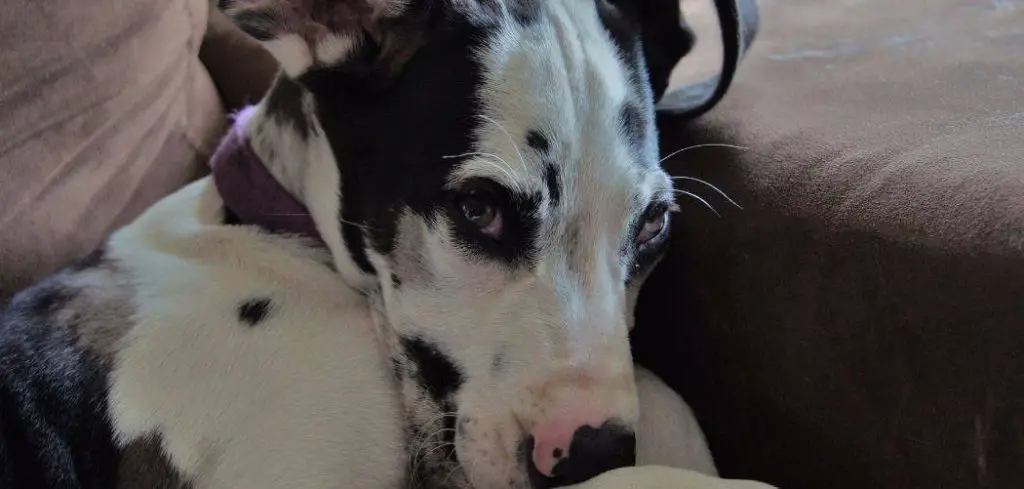Excessive drooling and licking in dogs can be unsettling to witness, especially when the behavior appears out of nowhere.
Whether it’s constant saliva pooling or a dog obsessively licking surfaces, paws, or even people, this combination of symptoms often signals a deeper issue that deserves attention.
We outline the common reasons why a dog excessively drools and licks, what you can do at home, and when to seek veterinary help.

Table of Contents
Dog Excessively Drooling and Licking: Common Causes
Dental Disease
Dental problems are among the most common culprits behind both drooling and licking. Periodontal disease, gingivitis, infected teeth, or abscesses can cause significant mouth pain, leading dogs to drool more than usual.
To self-soothe, they may excessively lick their lips or surrounding areas.
You might also notice bad breath, visible tartar buildup, or pawing at the mouth.
This is not only uncomfortable but can lead to difficulty eating and more serious systemic infections if left untreated.
Read more: Dog drooling and not eating (Here’s why)
Nausea or Gastrointestinal Upset
Dogs often drool and lick excessively when they’re feeling nauseated. The nausea might stem from eating something they shouldn’t, motion sickness, or an underlying illness.
This behavior may be accompanied by lip smacking, grass eating, or vomiting.
Licking helps soothe their queasy stomach, while drooling is a response to nausea, much like it is in humans.
It’s a concern particularly if these signs are paired with a lack of appetite or repeated vomiting.
Foreign Object in Mouth or Throat
A stick, bone shard, or piece of toy lodged in your dog’s mouth can cause irritation and excessive drooling.
To try to remove the object, dogs may paw at their mouth or lick persistently.
You might not immediately see the object, but signs like sudden drooling, head shaking, or discomfort when eating point to a possible foreign body.
This can become dangerous quickly if it causes swelling, pain, or choking.
Anxiety or Stress
Dogs experiencing anxiety may show it in physical ways — including licking themselves, furniture, or even people excessively.
Some anxious dogs also drool heavily during stressful events like thunderstorms, car rides, or vet visits.
This is especially common in dogs with noise phobias or separation anxiety.
While not always dangerous, chronic stress and anxiety can degrade your dog’s quality of life and may require behavioral or medical intervention.
Toxic Ingestion or Irritation
Drooling and licking can be early signs that your dog ingested something toxic or irritating, such as certain plants, cleaning chemicals, or even human medications.
Some toxins produce a burning sensation in the mouth or stomach, causing intense drooling and frantic licking.
Other symptoms might include vomiting, trembling, or collapse, depending on the substance.
This is always an emergency — seek veterinary help immediately if you suspect toxin exposure.
Oral Ulcers or Inflammation
Conditions such as stomatitis or oral ulcers can make your dog’s mouth extremely uncomfortable.
The result? More drooling, constant licking at lips or paws, and sometimes blood-tinged saliva.
These conditions may arise due to autoimmune disease, dental trauma, or even certain infections.
Pain and inflammation around the gums, lips, or tongue warrant prompt veterinary evaluation to avoid worsening complications.
What to Do If Your Dog Is Excessively Drooling and Licking
If your dog suddenly starts drooling and licking more than usual, begin by observing closely for other symptoms — like vomiting, diarrhea, gagging, or behavior changes.
Check their mouth for visible issues like broken teeth, stuck objects, or red, swollen gums — but only if it’s safe to do so.
You can offer water and remove access to anything they may have chewed or licked that could be irritating them.
If anxiety seems to be a trigger, try creating a calm environment, using familiar scents, or applying pressure wraps like a ThunderShirt.
Avoid giving human medications unless directed by a vet. If signs persist or worsen, don’t wait — professional evaluation is essential.
When to Call or Visit Your Vet
Seek immediate veterinary care if you notice:
Your dog is vomiting repeatedly or appears lethargic.
You suspect they ate something toxic or harmful.
Their gums are red, bleeding, or inflamed.
You see signs of oral pain or they resist eating.
Drooling and licking have lasted more than a day with no improvement.
Sudden or severe drooling and licking is never something to ignore. It may indicate pain, discomfort, or even a life-threatening emergency.
Read more: Dog Excessively Drooling Suddenly (Explained)
Key Takeaway
Excessive drooling and licking in dogs are often signs that something’s wrong — whether it’s oral discomfort, nausea, anxiety, or toxin exposure.
Stay calm and observe your dog’s behavior closely. You can check their mouth and remove anything potentially irritating.
However, if symptoms persist or you’re unsure, it’s safest to consult your vet.
With timely care, most causes can be addressed effectively — helping your dog feel comfortable and healthy again.
